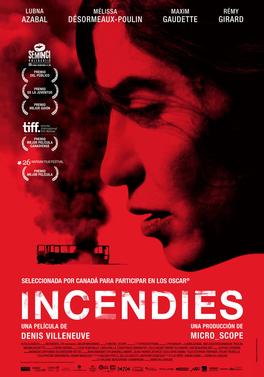The recent slew of films on Lebanon has focused on the 1982 Israeli invasion of the country: Waltz with Bashir (2008) and Lebanon (2009) both dealt with Israeli soldiers' experience. Incendies (2010) is a high-profile film from a Lebanese perspective, based on a play by Lebanese-Canadian Wajdi Mouawad, that is singularly uninterested in Israel (the 1982 invasion is mentioned in a throwaway comment), presenting instead an odyssey of civil war, family and reconciliation.
Québec, 2009: at the opening of the will, Jeanne Marwan (Mélissa Désormeaux-Poulin) and her brother Simon (Maxim Gaudette) discover that their recently deceased mother wants them to pass on letters to their father, whom they believed dead, and their brother, of whose existence they were unaware. Simon, angry at his mother's unusual request, refuses to return to the unspecified Middle Eastern country, but Jeanne decides to find out the truth in a country whose language she doesn't even speak.
This is interwoven with the story of her mother, Nawal Marwan (Lubna Azabal), a Christian from the south of the country, who in around 1970 conducts a love affair with a Muslim refugee. Members of her community kill her lover, but Nawal is already pregnant. She consents, ath the insistence of her grandmother, to give her newborn son to an orphanage and is sent away to university. As the country descends into sectarian strife, she leaves in search of her son but finds the orphanage destroyed. Pretending to be a Muslim for safety, she travels in a group that is eventually massacred by Christian militias. Having escaped only by revealing she is a Christian, Nawal joins a Muslim warlord's forces to wreak vengeance on the killers.
For much of Incendies, I was confused by the film's refuseal to name its setting, for the fictional Middle Eastern country is clearly Lebanon, the place of Wajdi Mouawad's birth. The specific situation of a civil war between Christian and Muslim militias over large numbers of refugees in the south, interrupted by a 'foreign invasion', is not what you'd call vague. By the end I understood. There is a plot twist that is grossly unlikely 'in reality', but brings home the theme of the film:
This twist, an allusion to Greek myth, necessarily throws the film into unreality. Nor, for a film about Lebanon, is Incendies terribly interested in judging that conflict: it is neither pro- nor anti-sectarian, but treats the events of civil war as fate. This attitude is best encapsulated in the retired Muslim warlord Wallat Chamseddine (Mohamed Majd, in a terrific scene-stealing performance), who is neither regretful nor proud of his actions, only wary of the possible consequences. Incendies depicts the civil war as terrible but nonetheless unalterable: its focus is on family shaped by conflict.
All the same, Incendies is a harrowing indictment of inhumanity. A number of scenes dealing with rape as prison torture and its aftermath are very difficult to watch, as is the massacre of a passenger bus by militias, including the shooting of a child. The acting is excellent, especially Lubna Azabal, who portrays Nawal as a person driven by love and, increasingly, revenge for her suffering that leads her to participate in the civil war on the 'other side'. The fluidity of her identity is signalled by a scene in which she quickly hides her cross necklace and puts on a headscarf to approach a group of Muslims.
The writing, adapted from a play, it is perhaps too 'literary': 'L'enfance est un couteau planté dans la gorge' is great writing, but it rings false in the film's setting. (Incidentally, I was pleased to discover my French appears to have gone from abysmal to merely bad, as I was able to understand most of the French dialogue.) The often over-elaborate style points to the film's mythic quality: though rooted in the Lebanese Civil War, it becomes a parable of conflict in the region.

No comments:
Post a Comment